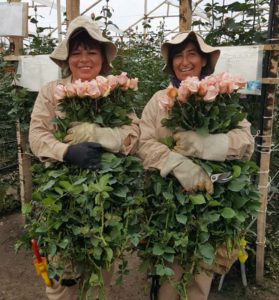
Ayura Eclipse Pride Flowers in Colombia takes care of its workers as well as the flowers they nurture.
Some of the roses being delivered for Valentine’s Day (and year-round) come with a sweet story — a story of sustainability that starts with the soil and extends all the way to the hands that harvest and pack the flowers.
The January/February issue of Floral Management explores how an Ecuadorian and Colombian rose farm grow roses sustainably, from enriching the soil with natural fertilizers to social programs that care for farm workers and their families.
Organic Pest Control
Hacienda Santa Fe is a small farm in Ecuador with 12 hectares of rose production near the capital of Quito. For Valentine’s Day it increases production from 20,000 stems a week to 400,000 stems per week — its biggest and only peak. One key to ensuring a healthy crop is using biological controls to eliminate pests. The farm uses beneficial spider mites to attack malicious spider mites, a strategy the company has employed for about 20 years. The farm also uses a natural fertilizer that enriches the soil with micro and macro organisms which help the plants develop stronger immunity to pests and disease. Hacienda Santa Fe earned FlorEcuador’s sustainability certification 11 years ago.
Nurturing the People
Ayura Eclipse Pride Flowers in Colombia takes care of its workers as well as the flowers they nurture. Workers are given a choice of whether they want to work overtime to earn more money or keep their regular hours, says owner José Antonio Restrepo. And in the weeks leading up to Valentine’s Day, employees are given three meals a day and breaks for coffee. Those who work until dark are provided transportation home so they don’t have to travel on their own in the dark. Ayura Eclipse Pride Flowers is one of 107 farms in Colombia certified through Asocolflores’ (the Colombian Association of Flower Exporters) Florverde Sustainable Flower Program.
To read more about how both farms grow roses sustainably, including conserving resources, read “The Road to Sustainable Roses” in the January/February issue of Floral Management. To read more about sustainability in the floral industry, check out the Society of American Florists’ Sustainability Spotlight.
Amanda Jedlinsky is the managing editor of SAF NOW.

